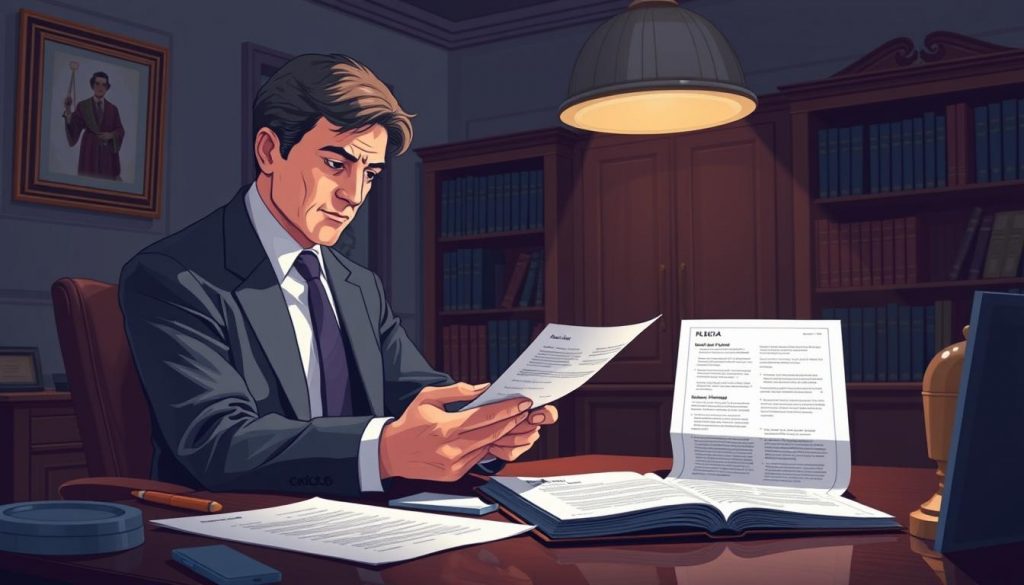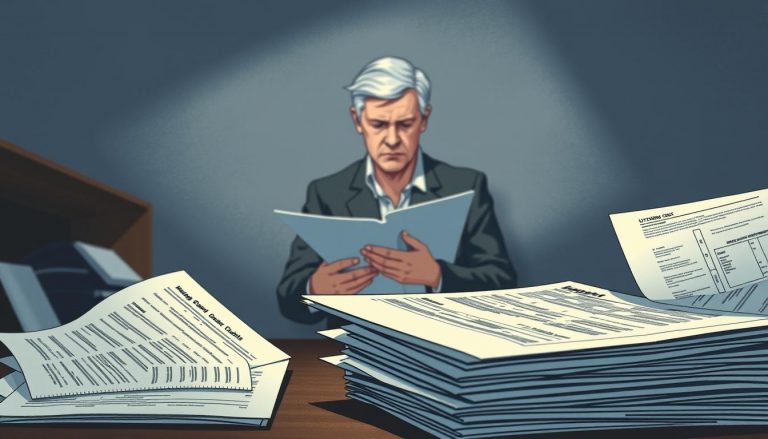When a loved one passes away, their financial obligations can become a significant concern for those left behind. In the UK, the general rule is that deceased person’s debts are paid from their estate. This means that the deceased’s assets are used to settle their outstanding financial commitments.
You’re only responsible for a deceased relative’s debts if you had a joint loan or agreement or provided a loan guarantee. For instance, if you co-signed a mortgage or credit agreement, you would be liable for the outstanding amount. To understand more about how this works in specific situations, such as care home fees, you can visit our page on whether next of kin are responsible for care home.
Key Takeaways
- Debts of the deceased are generally paid from their estate.
- You are not usually responsible for a deceased relative’s debts.
- Exceptions include joint loans or guarantees.
- Understanding your financial obligations can help you navigate difficult situations.
- Seeking professional advice can provide clarity on managing a deceased’s estate.
Understanding Family Debt After Death in the UK
Dealing with a deceased relative’s financial obligations can be a daunting task for families in the UK. When a family member passes away, their debts do not simply disappear; instead, these financial responsibilities become part of their estate.
An estate encompasses all the assets, including cash, investments, property, and personal belongings, owned by the deceased. Understanding how these assets and debts are managed is crucial for families navigating the aftermath of a loved one’s passing.
What Constitutes Family Debt?
Family debt, in this context, refers to the financial obligations left behind by the deceased. This can include various types of debts such as mortgages, credit card balances, personal loans, and utility bills.
Types of Debts That May Be Incurred
The types of debts that may be incurred can vary widely. Some common examples include:
- Mortgages and secured loans
- Credit card debt
- Personal loans and overdrafts
- Utility bills and other regular payments
Understanding the nature of these debts is essential for determining how they will be managed and settled.
The Role of Executors in Debt Management
Executors play a pivotal role in managing the estate of the deceased, including dealing with their debts. An executor is responsible for:
- Identifying and valuing the estate’s assets
- Paying off debts and taxes
- Distributing the remaining assets according to the will or intestacy rules
Executors must navigate complex financial and legal obligations, making their role crucial in ensuring that debts are handled appropriately.
| Executor Responsibilities | Debt Management Actions |
|---|---|
| Identifying Assets | Valuing assets to pay off debts |
| Paying Debts | Settling outstanding financial obligations |
| Distributing Assets | Allocating remaining assets to beneficiaries |
Legal Obligations for Inheriting Debt
Understanding the legal obligations surrounding debt inheritance is crucial for families dealing with the loss of a loved one. In the UK, the rules governing debt inheritance can be complex, and it’s essential to know what you’re responsible for and what you’re not.
“You don’t automatically inherit your partner’s debts when they die,” says a financial expert. This is a common misconception that can cause unnecessary stress for families. The reality is that the deceased person’s estate is responsible for their debts, not the family members or heirs directly.
The Difference Between Secured and Unsecured Debt
It’s vital to distinguish between secured and unsecured debts when dealing with a deceased person’s financial obligations. Secured debts are tied to a specific asset, such as a mortgage on a house or a loan against a car. If the deceased had a secured debt, the lender can repossess the asset to recover their losses.
On the other hand, unsecured debts are not linked to any particular asset. Examples include credit card debt, personal loans, and medical bills. Unsecured debts are typically paid from the deceased person’s estate, and if there’s not enough money, these debts may be written off.
When Debt Is Not Inherited
In most cases, family members are not personally responsible for a deceased relative’s debts unless they’ve co-signed a loan or credit agreement. For more information on inheriting debt, you can visit https://thenbs.org/practical-support/inheriting-debt.
However, there are some exceptions and considerations to be aware of:
- If you’ve co-signed a loan or credit agreement, you’re responsible for the debt.
- If you’re a joint account holder, you’re equally responsible for the debt.
- If you’ve inherited assets from the deceased person’s estate, you may need to use those assets to pay off debts.
It’s also worth noting that certain types of debt, such as Income Tax or National Insurance arrears, are considered priority debts and are usually paid first from the estate.
By understanding the difference between secured and unsecured debt and knowing when you’re not responsible for a deceased relative’s debts, you can navigate this challenging situation with more confidence.
The Process of Settling a Deceased Person’s Estate
When a loved one passes away, settling their estate can be a daunting task, especially when it comes to dealing with outstanding debts. The estate is managed by executors or administrators who need to apply for probate or letters of administration to settle debts.
How Debts Are Assessed
Assessing debts is a critical step in the process. The executor must identify all the deceased person’s debts, which can include:
- Credit card debts
- Mortgages
- Personal loans
- Utility bills
- Taxes owed
It’s essential to notify creditors of the deceased’s passing. Creditors will then submit their claims to the executor, who must verify these claims before settling them.
The Timeline for Settling Debts
The timeline for settling debts can vary significantly depending on the complexity of the estate. Generally, executors have to:
- Gather information about the estate’s assets and liabilities
- Notify creditors and other relevant parties
- Pay off debts and taxes
- Distribute the remaining assets according to the will or the rules of intestacy
This process can take several months to a few years. It’s crucial for executors to keep beneficiaries informed about the progress and any challenges encountered.

Potential Pitfalls in the Process
Executors may face several challenges when settling an estate, including:
- Disputes among beneficiaries
- Complex or disputed debts
- Insufficient liquidity to pay debts
- Tax implications
As one legal expert notes, “The role of an executor is not just to manage the estate’s assets but also to navigate the complex legal landscape surrounding debt settlement.” Executors should seek professional advice when needed to avoid potential pitfalls.
The Role of the Executor in Handling Debt
Executors play a vital role in ensuring that the debts of the deceased are handled properly, according to UK laws. This involves a series of complex tasks that require careful management to ensure that the estate is settled efficiently.
Responsibilities of an Executor
An executor’s responsibilities are multifaceted, including:
- Identifying and valuing the assets of the estate
- Notifying creditors and settling debts
- Managing the distribution of the estate according to the will
- Ensuring compliance with UK laws and regulations
These tasks require a high level of organization and attention to detail, as executors must balance the needs of various stakeholders, including beneficiaries and creditors.
Executor Compensation and Fees
Executors are entitled to compensation for their services, which can be specified in the will or agreed upon with the beneficiaries. The compensation typically covers the time, effort, and expertise required to manage the estate effectively.
Key factors influencing executor compensation include:
- The complexity of the estate
- The time required to settle the estate
- Any professional fees incurred, such as legal or accounting services
In conclusion, the role of an executor in handling debt is crucial for the efficient settlement of an estate. By understanding their responsibilities and the compensation they can receive, individuals can better navigate the complex process of estate administration.
Implications of Joint Debts on Family Members
The financial responsibilities of family members regarding joint debts after a death in the UK can be complex and need careful consideration. When a family member passes away, their debts don’t automatically disappear, and this can have significant implications for those left behind, especially if they have joint accounts or loans.

Understanding Joint Accounts and Loans
Joint accounts and loans are financial products shared between two or more individuals. In the UK, when you open a joint bank account or take out a joint loan with someone, you are both equally responsible for the debt incurred. This means that if one account holder or borrower dies, the remaining individual(s) are still liable for the full amount of the debt.
For instance, if you have a joint mortgage with your spouse and they pass away, you are still responsible for paying off the entire mortgage. Similarly, joint credit cards or loans mean that both parties are liable for the full balance.
Key points to consider about joint debts:
- Both parties are equally responsible for the debt.
- The death of one party does not absolve the other of their financial responsibilities.
- Creditors can pursue the surviving account holder(s) for the full amount owed.
Consequences for Co-borrowers
Co-borrowers, or joint account holders, face significant financial implications upon the death of their counterpart. The surviving co-borrower(s) must continue to service the debt, which can be challenging, especially if they were reliant on the deceased’s income to meet the repayments.
In some cases, the surviving co-borrower may need to reassess their financial situation and potentially adjust their budget to accommodate the full debt repayment. It’s also worth noting that creditors do not typically “forgive” debts upon death; they will seek repayment from the estate of the deceased or the surviving co-borrower.
Consider the following scenario:
If a husband and wife have a joint loan and the husband dies, the wife becomes solely responsible for repaying the loan. If she cannot afford the repayments, she may be at risk of having her credit score affected or facing legal action from the creditor.
To mitigate such risks, it’s advisable for co-borrowers to:
- Review their financial commitments and plan accordingly.
- Consider life insurance that covers outstanding debts.
- Seek financial advice to understand their obligations fully.
How to Handle Debts When There’s No Will
When a family member passes away without leaving a will, it can be challenging to navigate the complexities of their estate, including any outstanding debts. In such cases, the estate is handled according to the rules of intestate succession.
Intestate Succession and Debt Responsibility
Intestate succession refers to the legal process that determines how the estate of a deceased person is distributed when there’s no will. This process also influences how debts are handled. According to UK law, the estate is responsible for paying off debts before any inheritance is distributed.
The administrators of the estate, usually close relatives, are tasked with managing the estate’s assets and liabilities. They must identify all debts, including credit cards, loans, and other financial obligations, and settle them according to their priority.

Seeking Legal Advice
Navigating the complexities of intestate succession and debt responsibility can be daunting. Seeking legal advice is often crucial in ensuring that the estate is handled correctly and that all legal obligations are met.
A legal professional can provide guidance on the intestacy rules, help identify and prioritize debts, and advise on communicating with creditors. They can also assist in managing the estate’s assets to meet the financial obligations, ensuring that the process is carried out fairly and in accordance with UK law.
It’s essential to understand that while the estate is responsible for debts, personal liability for these debts typically does not transfer to family members unless they are co-signers or guarantors. However, the estate’s assets will be used to clear these debts before distribution.
For families dealing with the loss of a loved one and the complexities of their estate, seeking professional advice can provide clarity and peace of mind during a difficult time.
The Impact of National Insurance and Tax on Debts
Dealing with the financial affairs of a deceased relative involves navigating the intricate relationship between National Insurance, tax, and outstanding debts. When a person dies, their estate must settle various financial obligations, including debts and taxes, before distributing any inheritance.
Inheritance Tax Implications
Inheritance Tax (IHT) is a critical consideration when settling an estate. In the UK, IHT is paid from the estate before debts are settled. The standard IHT rate is 40%, but this is only applied to the amount above the threshold (£325,000 for individuals and £650,000 for married couples or civil partners). Understanding how IHT works is crucial because it directly affects the estate’s ability to settle debts.
For instance, if the estate’s value exceeds the IHT threshold, the tax owed will reduce the amount available to pay off debts. This can potentially leave creditors with less than the full amount they are owed. It’s essential to consider IHT implications early in the estate settlement process to manage expectations and make informed decisions.
How Taxes Affect Estate Settlements
Taxes owed by the deceased, including income tax and capital gains tax, must be paid from the estate. These tax liabilities can significantly impact the estate’s overall value and, consequently, the amount available for debt settlement and inheritance.
Let’s consider an example to illustrate this:
| Estate Component | Value (£) | Tax/Owed (£) |
|---|---|---|
| Estate Value | 500,000 | |
| Inheritance Tax | 70,000 (40% of 175,000 above 325,000 threshold) | |
| Income Tax Owed | 5,000 | |
| Total Debts | 100,000 | |
| Net Estate After Taxes and Debts | 325,000 |
In this example, the estate’s value is £500,000. After paying IHT (£70,000) and income tax owed (£5,000), and settling debts (£100,000), the net estate available for distribution is £325,000. This illustrates how taxes and debts can significantly reduce the estate’s value.
Understanding the impact of National Insurance and tax on debts is vital for executors and beneficiaries. By grasping these concepts, individuals can better navigate the complex process of estate settlement and make more informed decisions regarding the deceased’s financial affairs.
Dealing with Creditors After a Death
Dealing with creditors after a death involves several legal and financial considerations. When a person passes away, their debts do not disappear; instead, they become the responsibility of their estate. Executors or administrators of the estate must communicate with creditors and settle these debts according to the law.
Communicating with Creditors
Effective communication with creditors is crucial in managing the deceased’s debts. Executors should notify creditors of the deceased’s passing and provide them with the necessary information to make claims against the estate. This process helps in identifying the debts that need to be settled.
When communicating with creditors, it’s essential to keep detailed records of all correspondence. This includes:
- Notifying creditors of the death
- Providing documentation, such as the death certificate and probate (if granted)
- Responding to creditor inquiries
- Negotiating settlements or payment plans if necessary
Rights of Creditors vs. Rights of Heirs
Balancing the rights of creditors with those of heirs is a delicate task. Creditors have the right to claim debts from the estate, while heirs have the right to inherit the remaining assets after debts have been settled. Executors must ensure that debts are paid in accordance with legal priorities.
The order of priority for settling debts is typically as follows:
| Priority | Type of Debt | Description |
|---|---|---|
| 1 | Funeral Expenses | Costs associated with the funeral |
| 2 | Secured Debts | Debts secured against assets, such as mortgages |
| 3 | Unsecured Debts | Debts not secured against assets, such as credit card debts |
Executors must manage these priorities carefully to ensure that the estate is settled fairly and in accordance with the law.
Support Resources for Families in Debt Situations
When dealing with the financial obligations of a deceased family member, it’s essential to know where to turn for support. Managing the debts left behind can be a daunting task, but there are various resources available to help families navigate this challenging situation.
Families can access several forms of support to help manage the financial burden. We will explore the legal aid and support services available, as well as debt management organizations that can provide assistance.
Legal Aid and Support Services
Legal aid is available for those who need help understanding their rights and responsibilities regarding a deceased family member’s debts. Legal aid services can provide guidance on how to manage the estate and deal with creditors. Organizations such as the Citizens Advice Bureau offer free legal advice and can help individuals understand their options.
In addition to legal aid, there are other support services available. These include bereavement support groups and financial counseling services. These resources can provide emotional support and practical advice on managing financial difficulties.
Debt Management Organisations in the UK
Debt management organizations specialize in helping individuals and families manage their debts. These organizations can negotiate with creditors on behalf of the family, potentially reducing the amount owed. Some well-known debt management companies in the UK include National Debtline and StepChange Debt Charity.
These organizations can also provide guidance on creating a plan to pay off debts and offer ongoing support throughout the process. By working with a debt management organization, families can regain control over their finances and work towards a more stable financial future.
It’s crucial for families to explore these support resources when dealing with a deceased relative’s debts. By seeking help from legal aid services and debt management organizations, families can better navigate the complexities of managing financial obligations and find a path towards financial recovery.
Avoiding Debt Accumulation Before Death
Proper financial planning is crucial in preventing debt accumulation that can burden families after a loved one’s death. By taking proactive steps, individuals can ensure that their estate is managed effectively, reducing the likelihood of significant debts being left behind.
Effective Financial Planning Strategies
Families can benefit from creating a comprehensive financial plan that includes managing debts, building savings, and making informed investment decisions. This proactive approach helps in settling debts after death in the UK, ensuring a smoother process for those left behind.
The Role of Life Insurance
Life insurance plays a vital role in covering funeral expenses and outstanding debts, thereby protecting the financial well-being of family members. By making informed life insurance decisions, individuals can ensure that their loved ones are not burdened with debt, providing peace of mind for all parties involved in managing family debt after death in the UK.
By combining effective financial planning with appropriate life insurance coverage, individuals can significantly reduce the risk of leaving behind substantial debts, thus safeguarding their family’s financial future.


